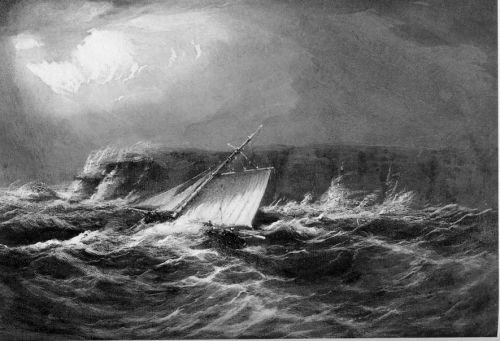- Author
- Hordern, Marsden
- Subjects
- History - pre-Federation
- Tags
-
- RAN Ships
- None noted.
- Publication
- June 2003 edition of the Naval Historical Review (all rights reserved)
Just before 3 a.m., Roe was jerked out of a deep sleep by shouts on deck and a despairing cry, ‘It’s no use, there’s no room to wear!’ Pulling on his trousers, he snatched his jacket and cap and scrambled on deck. ‘Young as I am,’ he told his father, ‘I have seen Death in various shapes . . . but never before encountered him at such close quarters.’ With cliffs towering above her masthead, the Mermaid was moving in the very wash of the surf. Roe continued:
‘Certain destruction seemed now inevitable . . . lightning exposed despair on every countenance – only God could save us . . . moments would decide our fate like men ascending a platform for execution . . . the truly humble sensations are not to be described, my blood freezes when I think of them’.

King also recorded the horror of the moment:
‘A third flash of lightning confirmed our fears as to the dangerous situation we were in; and as there was not room to veer, the helm was immediately put a-lee; but, as was feared, the cutter refused stays. We were now obliged to veer as a last resource and the sails being manoeuvred so as to perform this operation as quickly as possible, we fortunately succeeded in the attempt, and the cutter’s head was brought to the wind upon the other tack without her striking the rocks: we were now obliged to steer as close to the wind as possible, in order to weather the reef on which the sea was breaking, within five yards to leeward of the vessel. Our escape appeared to be next to impossible: the night was of a pitchy darkness, and we were only aware of our situation from time to time as the lightning flashed: the interval, therefore, between the flashes, which were so vivid as to illumine the horizon round, were of a most awful and appalling nature, and the momentary succession of our hopes and fears, which crowded so rapidly upon each other, may be better imagined than described. We were evidently passing the line of breakers very quickly; but our escape appeared to be only possible through the interposition of a Divine Providence, for, by the glare of a vivid stream of forked lightning, the extremity of the reef was seen within ten yards from our lee bow; and the wave which floated the vessel the next moment broke upon the rocks with a surf as high as the vessel’s masthead: at this dreadful moment the swell left the cutter, and she struck upon a rock with such force that the rudder was nearly lifted out of the gudgeons: fortunately we had a brave man and a good seaman at the helm, for instantly recovering the tiller, by a blow from which he had been knocked down when the vessel struck, he obeyed my orders with such attention and alacrity that the sails were kept full; so that by her not losing way, she cleared the rock before the succeeding wave flowed from under her, and the next moment a flash of lightning shewed to our almost unbelieving eyes that we had passed the extremity of the rocks and were in safety!’
The players in this perilous drama reacted to their unexpected salvation in various ways. From everyone on board the Mermaid it brought a ‘spontaneous acknowledgement of Divine Providence.’ Roe also found it a maturing experience. Standing beside King and watching the breakers rise ‘in terrible grandeur’ he was suddenly ‘possessed of a feeling of serenity and composure,’ viewing ‘each overwhelming wave as it broke’ with a certain detachment. King’s relief was so intense that, according to Roe, ‘he found vent in a flood of tears.’ Then, mastering himself, he thanked God for their deliverance.




